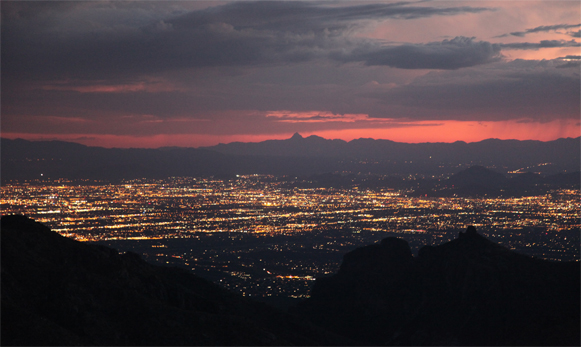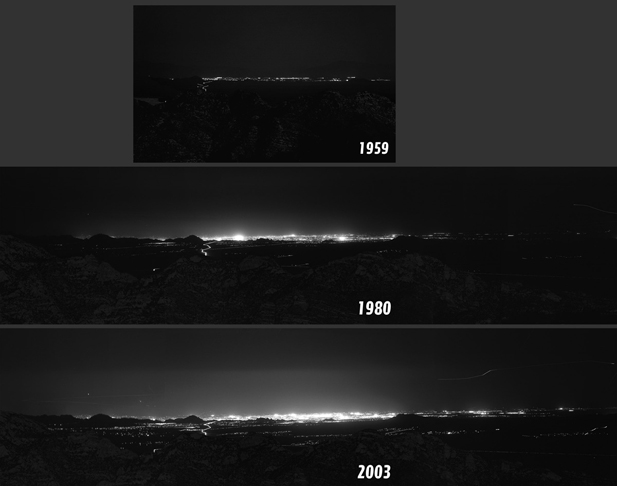Astronomers generally agree that several factors make Arizona good for sky-gazing. Our lack of clouds, high mountaintops and dark skies all make the state perfect for both professional and amateur astronomers. But light pollution is still a problem. Lori Allen, Deputy Director of Kitt Peak National Observatory, says any light from a source other than a distant object in the night sky can mar observations at today's sensitive telescopes.
One such telescope is the Large Binocular Telescope, or LBT in eastern Arizona. Richard Green is the LBT's director, and says recent light measurements taken at the telescope site on Mt. Graham show its one of the darkest observatory sites in the U.S. But those measurements are taken at zenith, or directly overhead. Green says "sky glow" from the lights of Tucson and Phoenix are still visible on the western horizon.
 The Tucson night skyline is darker than other cities of average size.
The Tucson night skyline is darker than other cities of average size.Scott Kardel is part of an organization that promotes dark skies. The Tucson-based International Dark Sky Association tries to educate states, counties, cities and even lighting manufacturers on how to make outdoor lighting more efficient. The aim, Kardel says, is to reduce wasted light cast upward, and instead to concentrate the light in a particular area.
But some communities resist efforts to reduce lighting. Kardel explains that many people want more outdoor lighting for safety purposes, and will not be swayed by arguments that more lighting makes it harder for astronomers to study distant galaxies.
Web Extra: Hear the entire interview with The International Dark Sky Association's Scott Kardel:
Arizona astronomers were galvanized into action in 2012, when legislation passed the statehouse allowing more electronic billboards. The LED-powered billboards emit lots of light in several directions from the billboard. And that had astronomers worried. They saw the proliferation of more LED billboards as a direct threat to astronomy. Gov. Jan Brewer agreed, and vetoed the bill. But compromise legislation passed a few weeks later, and Brewer signed it into law. The new law restricted electronic billboards to the Phoenix metro area and in western Arizona. It forbids LED-powered billboards in southern and northern Arizona, to protect observatories in those areas. Astronomers are cautiously waiting to see if it adds to overall light pollution in Arizona.
 Electronic billboards are powered by thousands of tiny LEDs, which emit large amounts of light.
Electronic billboards are powered by thousands of tiny LEDs, which emit large amounts of light.
Several astronomers, including LBT director Richard Green, point out the economic benefit astronomy and space sciences have on Arizona's economy. The public viewing programs at Kitt Peak, The Mt. Lemmon Sky Centerand Lowell Observatory have created a sort of "astro-tourism" in Arizona, where people are eager to look through telescopes and hear about the latest research.
The University of Arizona's business school, the Eller School of Management, released an economic impact study of astronomy, planetary and space sciences research in Arizona in October 2007:
The image below, courtesy of Kitt Peak National Observatory, shows the progression of light pollution from Tucson over a nearly 40-year period.

Visit the Collecting Light website for more stories, interviews, resources and images.



By submitting your comments, you hereby give AZPM the right to post your comments and potentially use them in any other form of media operated by this institution.